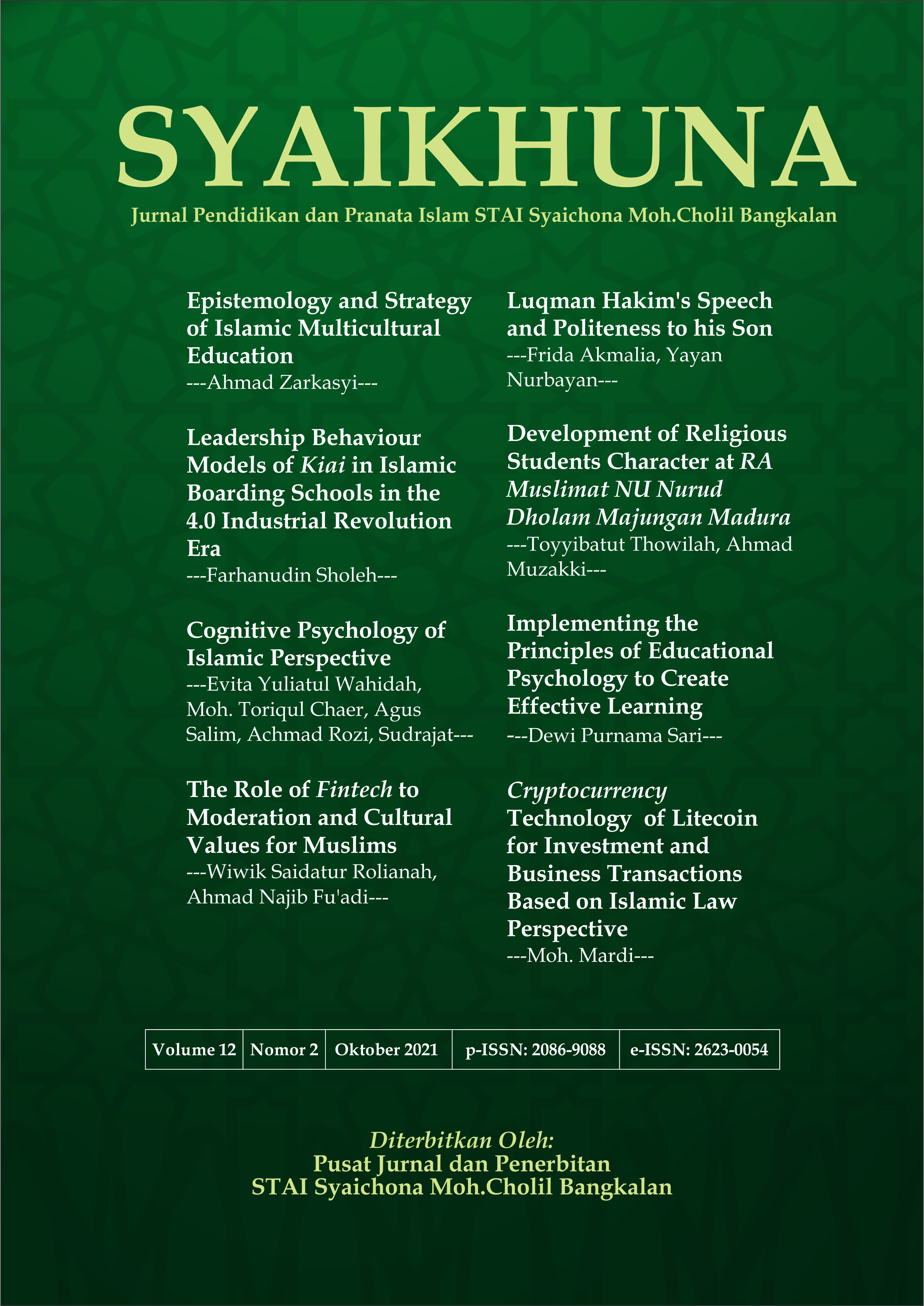Development of Religious Students Character at RA Muslimat NU Nurud Dholam Majungan Madura
DOI:
https://doi.org/10.36835/syaikhuna.v12i2.4858Keywords:
Development, Character, ReligiousAbstract
Pembelajaran dapat dikatakan berhasil jika terdapat tahapan-tahapan perubahan perilaku pada diri siswa. Proses pembelajaran pada anak sejak dini merupakan dasar awal pembentukan karakter. Pembelajaran dan pengembangan karakter religius pada anak memiliki peran yang signifikan karena pendidikan membutuhkan proses yang menjadikan anak religius. Wawancara dan observasi merupakan metode pengumpulan data yang digunakan dalam penelitian ini. Subjek penelitian adalah empat orang, tiga guru dan satu kepala sekolah. Analisis data menggunakan model Miles dan Huberman yang meliputi reduksi data, penyajian data dan verifikasi—pengecekan keabsahan data menggunakan triangulasi sumber. Hasil penelitian menunjukkan bahwa pengembangan karakter religius di RA Muslimat NU Nurud Dholam Majungan Madura adalah dengan mengamalkan akhlak yang baik di kelas, membuat kebiasaan rutin, memberikan reward, dan pengawasan guru kepada siswa. Faktor pendukung untuk mengembangkan karakter religius adalah semua guru dan administrator terlibat aktif dalam upaya ini. Faktor penghambatnya adalah kurangnya waktu yang tersedia di sekolah. Dukungan dari level paling inti sangat dibutuhkan yaitu keluarga, masyarakat, tokoh bangsa, dan tokoh agama dan masyarakat.References
Ahsanulkhaq, M. (2019). Forming the Religious Character of Students Through the Habituation Method. Journal of the Pedagogical Initiative, 2(1), 21–33.
Ananda, R. (2017). Implementation of Moral and Religious Values in Early Childhood. Journal of Obsession : Journal of Early Childhood Education, 1(1), 19. https://doi.org/10.31004/obsesi.v1i1.28
Arief, A. (2002). Introduction to the science and methodology of Islamic education. Press Ciputat.
Aziz, HA (2016). Professional Teacher Character. PT Al-Mawardi Prima. Cahyaningrum, ES, Sudaryanti, S., & Purwanto, NA (2017). Development of Early Childhood Character Values Through Habituation and Example. Journal of Children's Education, 6(2), 203–213. https://doi.org/10.21831/jpa.v6i2.17707
Devianti, R., Sari, SL, & Bangsawan, I. (2020). Character Education for Early Childhood. Mitra Ash-Shibyan: Journal of Education and Counseling, 3(02), 67–78. https://doi.org/10.46963/mash.v3i02.150
Djibu, R., & Shofwan, I. (2019). Development training model mentoring convection sewing in improving assistant competence. JPPM (Journal of Education and Community Empowerment), 6(2), 131–139.
Febianti, YN (2018). Edunomic Journal Vol. 6, No. 2, 2018 93. Edunomic Journal, 6(2), 93–102. https://core.ac.uk/download/pdf/229997374.pdf
Hamis Coates. (2005). The Value of Student Engagement For Higher Education Quality Assurance. Quality in Higher Education, 11(1), 25–36. https://doi.org/https://doi.org/10.1080/13538320500074915
Huberman, AM (2002). The Qualitative Researcher's Companion (Thousand O). Sage Publications.
Jaujah, Rindhatus, Qibtiyah, L. (2014). The Role Of Parents In Early Children's Character Education (Case Study of Family Teachers in Al-Amien Islamic Boarding School Environment. SYAIKHUNA: Journal of Islamic Education and Institutions STAI Syichona Moh. Cholil Bangkalan p-ISSN:2086-9088, e-ISSN: 2623-0054 DOI: https://Doi.Org/10.36835/Syaikhuna.V12i1.4300 ROLE, 12(1), 99–113. https://doi.org/10.36835/syaikhuna.v12i1.4300
Mila Sabartiningsih, Jajang Aisyul Muzakki, D. (2018). Implementation of Rewards And Punishment In. Journal of Children's Education, 4, 60–77.
Moleong, LJ (2006). Qualitative Research Methodology. Rosdakarya Youth.
Mulyasa. (2016). Character Education Management (1st Edition Ce). Earth Literature.
Pure. (2017). Implementation of Religious Character Education for Early Childhood. Proceedings of the National Seminar on 20 Postgraduate Programs at the University of PGRI Palembang, November, 107–112.
Prasanti, D., & Fitrianti, DR (2018). Early Childhood Character Building: Family, School, And Community. Formation of Early Childhood: Family, School, And Community, 2(1), 15.
Putri Rahayu, D. (2020). Strategies for Increasing Teacher Competence through Structured Mentoring in Developing Local Wisdom-Based Curriculum in Az-Zahwa Playgroup. Al-Athfal: Journal of Children's Education, 6(2), 161–174. https://doi.org/10.14421/al-athfal.2020.62-06
Rahayu, T. (2021). Development of Religious Character Values Based on Local Wisdom in MI Students. 1(2), 163–176. https://doi.org/10.35878/guru/v1.i2.290
Sugiyono. (2013). Quantitative, Qualitative and R&D Research Methods. Alphabet.
Syaroh, LDM, & Mizani, ZM (2020). Forming Religious Character by Habituation of Religious Behavior in Schools: Study at SMA Negeri 3 Ponorogo. Indonesian Journal of Islamic Education Studies (IJIES), 3(1), 63–82. https://doi.org/10.33367/ijies.v3i1.1224
Tarmizi, A., & Sulastri, S. (2017). The Role of Parents in Early Childhood Education. Raudhatul Athfal: Journal of Early Childhood Islamic Education, 1(October), 61–80.
Trimuliana, I., Dhieni, N., & Hapidin, H. (2019). Religious Behavior of Children 5-6 Years Old in Character Model PAUD. Journal of Obsession : Journal of Early Childhood Education, 3(2), 570. https://doi.org/10.31004/obsesi.v3i2.251
H. Wahyuni, (2021) Interview with Toyyibatut Thowilah, 24 June.
Hoiriyah, (2020) (2021) Interview with Toyyibatut Thowilah, 28 June.
R. Jannah, (2021) Interview with Toyyibatut Thowilah, 26 June.
M. Nikmah, (2021) Interview with Toyyibatut Thowilah, 22 June.
Downloads
Published
How to Cite
Issue
Section
License
Copyright (c) 2021 Toyyibatut Thowilah, Ahmad Muzakki

This work is licensed under a Creative Commons Attribution 4.0 International License.





